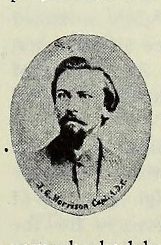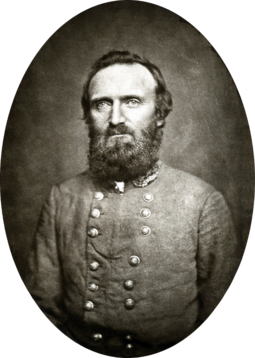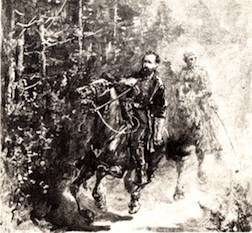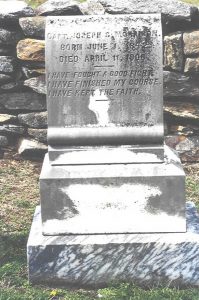Joseph Morrison: Stonewall’s Aide & Brother-in-Law

There had been enough excitement and confusion for one evening. The flank attack had been a smashing success, but darkness, thick trees, and undergrowth slowed the Confederate advance and disorganized their battle lines. General Jackson seemed somewhat irritated, wanting to press forward the attack. He insisted on doing a little scouting in advance of the Confederate lines. Joseph rode with him, accompanied by seven other staff officers, and several couriers.
They had turned back, riding near the Plank Road and heading toward the 7th and 18th North Carolina regiments, units already skittish about cavalry and horsemen in the night. At first it was scattering shots, then a volley from the 7th startled the group of officers. The 18th North Carolina men opened fire as General Jackson’s horse – Little Sorrel – bolted.
The young lieutenant felt his horse suddenly collapse as a bullet penetrated. The quick halt pitched the aide clear of the falling animal, but the officer smacked his head against one of the trees. Stunned but struggling to his feet, he ran toward the still firing North Carolinians and the direction Little Sorrel had taken.
“Cease firing!” he called into the darkness where muzzle flashes punctuated night. “You are firing on your own men!” The vigilant major on the battle line shouted back, “It’s a lie! Pour it into them, boys.” Lieutenant Morrison may have sheltered behind a tree or hit the ground when he heard that, but however he escaped unscathed, he still searched for his general. His next minutes blended into a frightful period of trying to get the North Carolinians to stop firing.
Then, he saw the scene. A couple officers crouching over an immovable fallen figure. Thomas was wounded and Joseph choked. “Are you much hurt?” he asked. Probably a fleeting thought entered his mind: “Would he have to tell Anna…?”

It had been a concern to both General Thomas J. Jackson and Lieutenant Joseph G. Morrison’s since the previous summer. What would Mary Anna do if she lost both her husband and brother in a battle? It was danger of brothers-in-law serving together. That night – May 2, 1863 – Jackson lay on the ground, silently fighting pain and his young brother-in-law hovered near him, afraid but trying to help.
Born in 1843, Joseph Graham Morrison grew up in North Carolina, one of thirteen children. Exciting opportunities appeared on the horizon for Joseph’s future when the Civil War broke out. Records suggest he joined state troops and was stationed somewhere along the North Carolina coast. The Morrison family might not have been keen on his active service because for one reason or another the nineteen-year-old got sent to Virginia Military Institute (VMI) in Lexington, Virginia.
Likely, Joseph entered VMI rather easily. His older sister, Mary Anna, had married one of the Institute’s professors: Major Thomas J. Jackson. By January 1862 when Joseph arrived in Lexington, Jackson had already left, promoted to brigadier general, and was wintering in Winchester with Mary Anna. Joseph failed to prioritize studying at this time in his life. He was old enough to soldier and technically only spent seven months at VMI – and those seven months extended over a period of two years.
By the summer of 1862, Joseph and possibly his older sister had persuaded “Stonewall” Jackson to appoint him to a staff position. Jackson carefully selected his staff officers; he chose men that he believed were best suited for the grueling work and rarely made a mistake in the appointment process. Family ties alone probably would not have secured a place for Joseph, suggesting that his brother-in-law knew about his skills and abilities. On July 25, 1862, Joseph Morrison received an appointment to First Lieutenant and six days later joined Jackson to serve as an aide-de-camp.
The title Aide-de-Camp came from a French term and a literal translation renders it “helper in camp.” It was not a servant’s position, but anyone holding the title need to be willing to assist with a large variety of tasks. In the modern era, this position would be equivalent to a personal assistant or secretary. Joseph helped organize Jackson’s papers, carried messages, filled out forms, chased off unwanted visitors, and a host of other duties that likely varied day to day. Eventually, he transitioned to the post of assistant adjutant general and likely did a lot of “paper pushing” under Sandie Pendleton and Charles Faulkner’s watchful eyes.
However, it was not all about the paperwork. In fact, Jackson and his officers did not get around to writing battle reports until months after the fights. Joseph joined headquarters in the brief lull between the Seven Days Battles and the opening of the next campaigns which would include Cedar Mountain and Second Bull Run.

Joseph had not been in camp very long and during one of his very first battlefield fights he had a difficult experience. Jackson had loaned his new aide-de-camp a horse, and the young man rode on the field with a “fearless and chivalric” bearing until a bullet or piece of shell tore off part of the horse’s jaw and the animal began bucking and rearing with pain. Other officers urged Jackson to go help Joseph or at least let someone assist him since the scene made the young man a conspicuous target for the enemy. That time Jackson refused – saying that Joseph had to learn how to behave and take care of himself on a battlefield. Clearly, relatives were not going to get specialty treatment at the Second Corps Headquarters.
Joseph Morrison served and fought with his famous brother-in-law through the Antietam Campaign, the Battle of Fredericksburg, and the winter months. In addition to military duties, he attended church and religious services with Jackson. Joseph was nearby to see his sister and meet his baby niece, Julia, during their visit at the end of April 1863.
On April 29th, Anna’s visit ended quickly when word arrived of the Union movements and opening campaign. When Jackson said good-bye to his wife, he promised to send her brother to take her to the station and possibly farther on her journey to Richmond. However, Joseph suggested that Reverend Lacy look after the ladies since he was needed at headquarters, a subtle hint to historians that Joseph had important work and a solid place on Jackson’s staff.
Three days later, the dreaded happened. General Jackson was wounded by friendly fire. The scenes in the dark woods and the hurried rush to get their wounded commander out of artillery fire and to an ambulance affected all of Jackson’s officers who were there. However, Joseph seems to have been one of the most emotionally affected. Not only was Jackson his commanding officer, he was his brother-in-law. They had grown close during pre-war North Carolina and Virginia visits and strengthened their relationship in the camps and on the battlefields as they worked through military situations.
 Grabbing one corner of the hastily found stretcher, Morrison join the race to get Jackson away from the front lines and toward medical care, later remembering that Jackson made no sound as they jostled him through the Wilderness. They dropped Jackson, and about that time artillery shells swept the area. Joseph later reported: “The whole atmosphere seemed filled with whistling canister and shrieking shell, tearing the trees on every side.” In this scene, Joseph and three others shielded Jackson with their bodies. When the explosive storm eased, they hauled the general in their arms and then again on the stretcher. Initially, Joseph climbed in the ambulance with Jackson, supporting him and trying to keep the rattling vehicle from jostling the injuries too much. When Dr. McGuire met the ambulance, Joseph gave up his seat to the experienced medical officer, but followed to the field hospital.
Grabbing one corner of the hastily found stretcher, Morrison join the race to get Jackson away from the front lines and toward medical care, later remembering that Jackson made no sound as they jostled him through the Wilderness. They dropped Jackson, and about that time artillery shells swept the area. Joseph later reported: “The whole atmosphere seemed filled with whistling canister and shrieking shell, tearing the trees on every side.” In this scene, Joseph and three others shielded Jackson with their bodies. When the explosive storm eased, they hauled the general in their arms and then again on the stretcher. Initially, Joseph climbed in the ambulance with Jackson, supporting him and trying to keep the rattling vehicle from jostling the injuries too much. When Dr. McGuire met the ambulance, Joseph gave up his seat to the experienced medical officer, but followed to the field hospital.
The next day Jackson seemed to be doing well. He summoned Joseph and ordered him to go to Richmond and bring Mary Anna and the baby back to camp. Joseph may have felt relieved; he wasn’t going to have to tell his sister that her husband was dying. Losing an arm was bad enough, but Anna could be thankful it wasn’t any worse. The lieutenant started off on his mission, getting to the railroad station and boarding a southbound train. That was just the beginning of his adventures.
Union cavalry under General Stoneman had hit the tracks between Guiney Station and Richmond, and the blue-clad horsemen still roamed the area. Joseph trekked through the words with Colonel French from the governor’s staff who was also headed to the capital city. They barely escaped captured at one point, then found or borrowed some horses for the last leg of the journey.
Dirty, tired, and possibly still emotional about his brother-in-law’s injury and the horrible night along the Plank Road, Joseph Morrison found his sister. He arrived after sunset on May 5, 1863, startling and scaring Anna until he told her the reassuring news. She knew that Jackson had been wounded and feared the worst when Joseph showed up. He broke the news about the amputation of her husband’s left arm and she wanted to leave immediately.
Unfortunately for Mary Anna and Joseph, the rail line did not reopen until for several days and the journey he had made on foot and horseback was impossible for her and a baby. Still, they arrived back at Guinea Station by noon on May 7, taking the first northbound train out of Richmond. Arriving at the office building at the Chandlers’ that had been converted into a hospital scene, the Morrison siblings realized all was not well with “Stonewall.”

Over the next days, Joseph hung back in the shadows the room and scenes. On May 9, Jackson asked Joseph to join Mary Anna to sing religious songs. The two of them struggled with emotions, but sang several Psalms and hymns. By that time, Jackson’s appearance and condition had deteriorated; he barely resembled the happy father from weeks earlier or the confident general waiting to launch the attack one week earlier.
It is not recorded if Thomas Jackson told his brother-in-law to stay with Mary Anna. It is probable that he did not, knowing that Joseph was already devoted to his older sister and would never leave her to mourn alone. In the end, Mary Anna told Thomas he was dying, and at 3:15 on May 10, 1863, Joseph and the other assembled officers watched helplessly as their commander took his final breaths. Jackson may have found rest in the shade of the trees, but a long journey had just begun for Joseph, Mary Anna, and the staff officers.
Joseph accompanied his sister to Richmond for the funerals, then to Lexington for the burial. Eventually, he took her back to their family home in North Carolina. Though other staff officers agreed to stay with the Second Corps and work with General Ewell, Joseph requested a transfer. He had lost a commander and a close family member and going back to headquarters may have brought too many memories and emotions for him to focus on the tasks.
Instead, Joseph served as an aide-de-camp for General Ramsuer and then took the position of adjutant for the 57th North Carolina Regiment in August 1863. Later in the war, he promoted to Captain of Company F in that regiment. During the Battle of Drewry’s Bluff on May 16, 1864, Joseph received a bad wound in his left foot, prompting an amputation; he survived the operation and the war.

Joseph Graham Morrison is one of the lesser-known officers of the Civil War and usually when he is mentioned it is only in connection to his famous brother-in-law. Joseph was close to his older sister and brother-in-law, seeking opportunity to serve on Jackson’s staff. He survived the volleys that wounded Jackson and killed other staff officers and spent the crucial moments trying to order his fellow North Carolinians to stop firing.
His battlefield efforts, the race to get Jackson off the field, and his devotion to his sister create a detailed picture of Joseph Morrison’s character and courage. His story serves as a reminder of the familial closeness of families and that one of the great tragedies was finding a wounded relative or having to break the news of injuries to other family members. Joseph did not have a glamorous role of holding the Second Corps together or performing medical operations, but he had one of the most important roles for General Jackson. He brought Mary Anna to Guinea Station, and Jackson had peace of mind knowing that the brother would look after the sister – no matter what happened.
Sources:
All quotations in the opening paragraphs are taken from Robertson’s biography and sourced from primary sources. They are not invented.
Robertson, James L. Stonewall Jackson: The Man, The Soldier, The Legend. (New York, MacMillan Publishing, 1997).
Douglas, Henry K. I Rode With Stonewall. (Chapel Hill, The North Carolina Press, 1940).
Jackson, Mary Anna. Memoirs of Stonewall Jackson. (Louisville, The Prentice Press, 1895).
VMI Archives – Roster: Joseph Morrison https://archivesweb.vmi.edu/rosters/record.php?ID=2515
Great human story Sarah. Where became of the NC Major that told his men to let them have it?
That’s a good question. I will look into it and try to write a blog post response later in the year. 🙂
The quick answer is Maj. John D. Barry never forgave himself. He went back to North Carolina after the war and died, according to his family and cited in an article by Robert Krick, of “melancholia.” Quite frankly it sounds like he drank himself to death.
Thank you Ryan.
Enjoyable reading !
Great article. Well done..
Thank you Sarah
It is a fact that Morrison after the war partnered with D.H. Hill in the publication of the magazine The Land We love. In 1868, the magazine published the article “The Lost Dispatch,” which Hill had authored. Upon its publication Morrison severed his relationship with Hill and left North Carolina and went to Northern California where he operated a farm in the Central Valley. After Lee’s death in 1870, Morrison returned to North Carolina. The question is, is the copy of the Lost Order in the possession of the Library of Congress in Morrison’s handwriting?